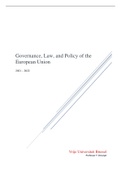Resume
Summary Governance, law and policy of the European Union
- Établissement
- Vrije Universiteit Brussel (VUB)
This is an extensive summary of the course governance, law and policy of the European Union given in the first year of the Master International Business, where all 10 questions that are included in the exam are discussed.
[Montrer plus]












